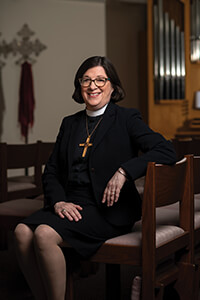God’s irresistible call
March 2, 2018
When first elected presiding bishop, I was often asked what it meant to be the first woman entrusted with this call. I didn’t like that question then. I’m still ambivalent about it now.
Why, in the 21st century, did my gender matter? Why, in 2013, was the election of a woman historic? I didn’t understand all the fuss. My parents had raised me to believe that if I worked hard enough I could be whatever I wanted to be when I grew up. My maternal grandmother was a businesswoman in the 1930s. My pediatrician was a woman. My high school biology teacher had her doctorate. All in the last century. However, “the question” does draw me to reflect on my journey in Word and Sacrament ministry.
We had a faithful home. Church was an important part of our lives. Sunday school, Sunday worship, vacation Bible school (I’m pretty adept at illustrating salvation history with pipe cleaners and Popsicle sticks), the seasons of the church year all shaped my life. God was real and close. So, when asked by my junior high guidance counselor what I wanted to be when I grew up, I answered: “A Lutheran pastor.” Women can’t be pastors, he told me, and that was that.
During my senior year in high school, my father had open-heart surgery. In 1973 this was a serious and risky procedure. My faith was shaken, and it caused me to ask all of the existential questions: Why do bad things happen to good people? If God is omnipotent and loving, why is there suffering? Is there a God? What does life mean? I presented these questions to my pastor, John Evans, and waited for answers. Instead of lecturing me, he gave me the space and the grace to think even more deeply. Then I went off to college.
College isn’t always conducive to church attendance. Having Sunday morning come after Saturday night on a college campus is not the best arrangement. I drifted, but I still had my list of questions. Then something unexpected happened—I went to a fine Presbyterian college and the assistant campus chaplain was a woman! So I sent her my list, and she also encouraged me to question, doubt and explore. I wasn’t the only one. She invited several of us to meet with her. We called ourselves the Heretics Group.
By my senior year I knew I didn’t want to be a band director. I applied to divinity school and was accepted! By now the Lutheran Church in America (an ELCA predecessor) had been ordaining women for seven years. By the end of my first year of div school I felt deeply called to Word and Sacrament ministry. I contacted my bishop and let him know. That’s not how the process works. One meets with one’s bishop before one attends seminary. Oops. Nevertheless, Kenneth Sauer, then bishop of the Southern Ohio Synod, brought me into the fold and I was a model candidate after that. I was ordained in 1981.
The 37 years I have served have been a blessing. I was encouraged by my pastors, supported by my church, and have been extended calls from congregations.
The 37 years I have served have been a blessing. I was encouraged by my pastors, supported by my church, and have been extended calls from congregations. But the 37 years have not been without difficulty. Early on I was often the only woman at clergy gatherings. The legitimacy of my call was challenged. My compensation was less than my male colleagues. In every congregation I served, people left because they couldn’t accept a woman pastor. Once, while pumping gas in my clerics, a shocked man exclaimed, “I’ve never seen a woman before!” A pastor told me that I was no bishop of his.
In this issue of Living Lutheran, you have read the stories of remarkable women living out their baptismal vocation as laypeople, pastors and deacons. We didn’t say yes to God’s call because we wanted to be pioneers, or trailblazers or to make some kind of a statement. We said yes because God’s call was irresistible, because of the joy of serving the gospel, because of the great privilege of walking with people as the deep love of Jesus becomes real for them. These are our call stories.


